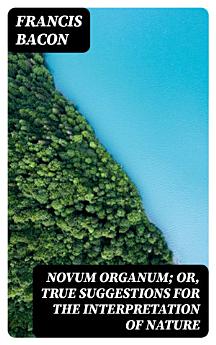Novum Organum; Or, True Suggestions for the Interpretation of Nature
Francis Bacon
Sep 2022 · DigiCat
Ebook
235
Pages
family_home
Eligible
info
reportRatings and reviews aren’t verified Learn More
About this ebook
In "Novum Organum; Or, True Suggestions for the Interpretation of Nature," Francis Bacon embarks on a transformative journey, championing the empirical method and laying the groundwork for modern scientific inquiry. This seminal work critiques traditional Aristotelian philosophy, advocating instead for a systematic approach to experimentation and observation. Bacon's literary style is incisive and pragmatic, infused with a sense of urgency for intellectual progress—an urgency that reflects the early 17th-century milieu marked by the Scientific Revolution. Through his innovative syllogisms and the dedication to challenging dogma, Bacon seeks to reconstruct the foundations of knowledge, emphasizing the necessity of inductive reasoning over deductive logic. Francis Bacon, often heralded as the father of empiricism, was deeply influenced by his experiences in a rapidly evolving intellectual landscape. A distinguished philosopher and statesman, Bacon's political career and his broad interests in sciences and humanities shaped his outlook on the pursuit of knowledge. His encounters with various disciplines fueled his conviction that the natural world could be understood through careful observation and methodical experimentation, leading him to pen this pivotal work that straddles philosophy and scientific thought. "Novum Organum" is indispensable for anyone interested in the history of science, philosophy, or the evolution of human thought. Bacon's assertions resonate with contemporary readers, urging them to question established truths and embrace curiosity. This book not only serves as a historical document but also as a powerful call to action for modern intellectuals seeking to understand the complexities of nature.
About the author
Sir Francis Bacon (1561-1626) was an eminent English philosopher, statesman, and essayist who is best known for his contributions to the development of the scientific method. Born on January 22, 1561, Bacon was educated at Trinity College, Cambridge, and later at Gray's Inn. He rose to political prominence, serving as the Lord Chancellor of England under James I. However, his political career was marred by allegations of corruption, and he was eventually impeached by Parliament. Despite his political fall from grace, Bacon's intellectual legacy endured, particularly through his influential works on philosophy and scientific methodology. His seminal work, 'Novum Organum; Or, True Suggestions for the Interpretation of Nature' (1620), represents a pivotal break from Aristotelian thought and laid the groundwork for modern scientific inquiry by advocating for empirical observation and inductive reasoning. In 'Novum Organum', Bacon criticized the syllogistic method of the time and proposed a new methodology for investigating nature, emphasizing the importance of experiments and the systematic collection of data. Bacon's literary style is characterized by its clarity, systematic approach, and didactic purpose. Bacon was also a pioneer of essay writing, with his 'Essays' covering a wide range of topics from politics to philosophy. He is often credited with the aphorism 'knowledge is power,' underscoring his belief in the transformational potential of learned inquiry. Bacon's ideas prefigured the Enlightenment, and his vision of scientific progress has had a lasting impact on the development of Western intellectual thought.
Rate this ebook
Tell us what you think.
Reading information
Smartphones and tablets
Install the Google Play Books app for Android and iPad/iPhone. It syncs automatically with your account and allows you to read online or offline wherever you are.
Laptops and computers
You can listen to audiobooks purchased on Google Play using your computer's web browser.
eReaders and other devices
To read on e-ink devices like Kobo eReaders, you'll need to download a file and transfer it to your device. Follow the detailed Help Center instructions to transfer the files to supported eReaders.







